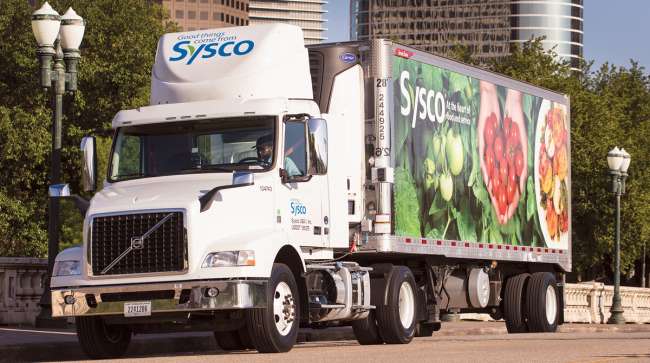Staff Reporter
Sysco Profit Dips as Avian Flu-Induced Inflation Bites

[Stay on top of transportation news: Get TTNews in your inbox.]
Profit at Sysco in the most recent quarter fell as cost growth outpaced sales wins due to inflation, particularly across the dairy and poultry sectors, the carrier said, adding that further price increases were on the way.
Sysco ranks No. 3 on the Transport Topics Top 100 list of the largest private carriers in North America, and No. 1 among food service carriers.
Net profit at Houston-based Sysco slid 2.16% in the 13 weeks that ended Dec. 28, the company’s second fiscal quarter of 2025, to $406 million from $415 million.
The decrease came as sales rose 4.46% year on year to $20.15 billion from $19.29 billion, but the company’s cost of sales rose 4.62% to $16.5 billion from $15.77 billion.
Overall product cost inflation was 2.1%, as measured by the estimated change in Sysco’s product costs, largely in the dairy and poultry categories, it said in results released Jan. 28.
“Avian flu, influenza for birds, is having a negative impact on supply, which is therefore increasing costs, specifically eggs, which has been very much in the media as of late,” CEO Kevin Hourican said during a Jan. 29 earnings call with analysts.
Want more news? Listen to today's daily briefing above or go here for more info
“And we don’t anticipate that pressure easing in the near term. We expect for that to continue. We expect for dairy and then specifically eggs to be inflationary because of avian influenza,” he added.
More than 19.2 million U.S. poultry were affected by avian flu in just the first 30 days of January, according to the latest U.S. Department of Agriculture data.
The number of eggs destined for American pantries fell 4.5% year over year in December, according to USDA, and more chickens were affected by avian flu in January than in December, meaning the number of eggs available is likely to fall yet further, hurting both food service and agriculture carriers.
There are more than 378.5 million egg-laying chickens in the United States.
Top-ranked agriculture carrier Tyson Foods has yet to release its latest quarterly earnings.
However, Hourican is not optimistic about meat supplies and inflation. “When we look at the protein categories, again, it’s the same root cause. It’s about a shortfall of product availability versus true demand, which tends to drive up price,” Sysco’s top executive told analysts.
David Bell, CEO of CloneOps.ai, discusses the impact of AI on the trucking industry. Tune in above or by going to RoadSigns.ttnews.com.
Sysco is more optimistic about demand from restaurants.
“Foot traffic to restaurants in the U.S. was down approximately 2% for [the company’s fiscal] second quarter, which represents a moderate improvement from Q1. We expect to see continued improvement in traffic trends as we head into the second half of the [Sysco] year,” said Hourican.
Sygma is the company’s U.S. customized distribution subsidiary for chain restaurants.
The unit posted sales of $2.12 billion in the most recent quarter, compared with $1.91 billion in the year-ago period.
At other divisions, U.S. food service sales for the second quarter increased 4.1% to $14.04 billion from $13.49 billion while international sales in the most recent quarter increased 3.6% to $3.73 billion from $3.60 billion.
Canada and Great Britain are Sysco’s largest two international markets.

Cheung
“The Sysco playbook is delivering across all geographies, driven primarily by our size and skill advantages in these markets along with M&A contributions from the recent specialty additions to the portfolio, which are performing well. We expect our positive momentum in International to step up further in the second half of the year,” Chief Financial Officer Kenny Cheung told analysts.
In October 2023, Sysco bought Chicago-based food service equipment and supplies distributor Edward Don & Co. Prior to the deal, Don operated more than 1.4 million square feet of distribution center and office space.
Twelve months later, the company bought Campbell’s Prime Meat, a Scottish meat and fish distributor, expanding in one of its largest international markets.




